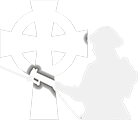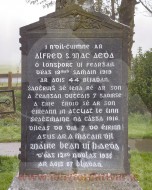Search Database
Alfred James MacHugh (alias James McDonnell) (alias McHugh)
| Rank: | Private |
|---|---|
| Street: | |
| Townland: | |
| Town/Village: | Dublin |
| Civil Parish: | |
| Catholic Parish: | |
| Country: | |
| Alternative Address: | Main Street, Longford; Ballymahon Street, Longford/ Templemichael, Longford/ Boyle, Co. Roscommon(?); Charles Street, Sligo; 26 Cross Street, Deptford, London; 83 Christian Street, Liverpool. |
| Census 1901: |
Resident at Charles Street, Sligo www.census.nationalarchives.ie/pages/1901/Sligo/Sligo_West_Urban/Charles_Street/1685185/ |
| Census 1911: | |
| Regiment/Unit: | Irish Citizen Army |
| Regiment Number: | |
| Date of Death: | 19-11-1919 |
| Cause: | Cerebral meningitis. |
| Memorial: | Ardagh Cemetery, Ardagh, Co. Longford |
| Information: | Alfred MacHugh was born 9 July 1875 in Longford town; he was baptised in St. Mel's Cathedral on the 13 July 1875. Alfred worked as a journalist and editorial cartoonist with the Roscommon Herald in Boyle, Co. Roscommon, 1898-1900, although his caricatures were published by the paper from about 1891. His later cartoons were often signed McQ or AMcQ. He disagreed with its editor Jasper Tully and was convicted of assaulting Tully. MacHugh was imprisoned for a month in Sligo. On his release he was employed by the Sligo Star which reported that on his conviction, many of the townspeople came out to support Alfred and cheer him on his journey. He was dismissed from the Star in 1902 after writing a scathing editorial about Edward VII. MacHugh lived in England, particularly in the London area for some years and was known to have given Irish language lessons there. He then moved from Liverpool to Dublin c. 1914/15. MacHugh served in the Irish Citizen Army using the alias ‘James McDonnell’. He did guard duty at Liberty Hall in the weeks before the rising. MacHugh was part of the contingent led by Captain Seán Connolly that occupied City Hall on Easter Monday, after abandoning a plan to take Dublin Castle. MacHugh and three other Citizen Army members occupied the near-by Dublin Evening Mail office, Parliament Street. He was wounded in the leg while on the roof of the building. After the rising, he was detained for a short period. He continued to live Dublin for some time and taught Irish. He may have joined the Fred Leo Concert Party in 1917, giving talks on Irish History with cartoons, that often bordered on seditious. Eventually, he returned to Liverpool where he worked as an oil mill labourer and died there in 1919. MacHugh is buried in Ardagh. |
| Parents Names: | Son of Bryan McHugh and Mary (née Gunning), Longford town |
| Notes: | Alfred's father, Bryan was from Co. Mayo and came to Longford as a shoemaker, later becoming a publican on Main Street - Bryan was also a Fenian Head Centre for Longford. Alfred's mother, Mary Gunning was from Ferefad; after her husband's death in 1885 initially took over the Main Street pub, before opening a stationers on Ballymahon Street, that she and later her daughter Maggie ran on Ballymahon Street. His younger sister, Mary Eveleen ran a bicycle shop on Talbot Street in Dublin for many years and was a strong supporter of Irish freedom. The youngest child, Nora, a talented writer in her own right, first became a teacher, before moving the US and working as a hospital nurse. She later returned to Longford and continued to run the Ballymahon St. premises well into old age. |
| Links: | Link to entry Irish Military Service Pension archives; link to Civil Record of Birth; link to Ireland 2016 speech by John Mimnagh, relative; Athy Eye On the Past - Fred Leo & Seumas M'Donnell; Roscommon Herald Obituary; |
Submit an Amendment
If you have information on this soldier then please submit an amendment


